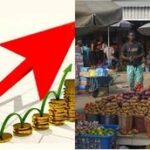Investors’ confidence in the stock markets globally is declining in the face of higher interest rates, soaring inflation, impending recession, and falling oil prices.
This led to the global stock market’s All-World Index falling for a second straight week, with the latest depreciation being -2.1 percent on Friday, reflecting concerns spreading across global equity market.
Join our WhatsApp ChannelOn Friday, Nigeria’s stock market had dipped -0.33 percent, the United States’ S&P 500 stock index was down 4.6 percent, while Europe’s Stoxx 600 reported a daily 2.3 percent, as first reported by FT.
Prime Business Africa had reported that Nigeria’s inflation rate hit 20.52% in August, rising by 0.8 percent, according to the National Bureau of Statistics (NBS), from July’s 19.64%.
The hike in inflation has raised expectation that the Central Bank of Nigeria (CBN) could raise monetary policy rate (MPR) again, considering the last time it increased interest rate, from 13 percent to 14 percent Nigeria’s inflation was at 18.60 percent.
With inflation surging, cost of living is rising, reducing purchasing power, and recession hovering over Nigeria’s economy. However, the country is not alone in this situation, as US reported historical high of 8.3% inflation, and UK registered 9.9 percent, one of the highest levels seen in 40 years.
The inflation rate in the US has seen the Feds increase interest rate by 0.75 percentage point (the third of such hike in successive months), to between 3% and 3.25%, highest in 15 years.
Also, Bank of England raised interest rates to 14-year high of 2.25%. The Central Bank of Nigeria has yet to meet over the MPR position since the inflation rate was announced, but expectation points to another raise in interest rates.
During this period, crude oil price has continued to fall from its high of over $100 to $86.15 per barrel, and in response to these economic shocks, investors’ confidence has been on a downward path, reducing their participation and pulling out investments in the equity market.
With expectations that higher interest rates, soaring inflation, falling oil prices could push global economy into recession, investors believe the stock market could become a collateral damage, considering companies topline and bottomline will be impacted due to decline in consumers’ purchasing power.
The acting Vice President for equitable growth, finance and institutions at the World Bank, Ayhan Kose, echoed this when he said there will be global funding shock for emerging and developing markets – which includes Nigeria – “and that will come with a very serious decline in demand for their goods. The combination of these could be rather deadly.” Kose stated.
He had projected a “perfect storm with weak growth, very high interest rates and an extremely challenging external environment when it comes to trade and foreign direct investment” for emerging and developing markets.
Kose says this is worrisome, and Goldman equity strategist, David Kostin, explained that same will happen to the US economy, stating “a majority of equity investors have adopted the view that a hard-landing scenario is inevitable.”


















Follow Us